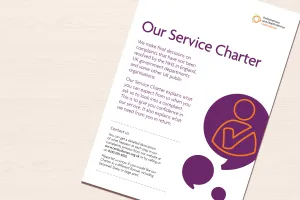Here you can find out what happens when we first receive your complaint, how we decide if we can investigate it and what to expect if we do.
To find out more about any of the steps in our process, follow the links below or call us on 0345 015 4033.
If you haven't complained to us yet, have a look at our Making a complaint page where you can find out how to do that and what steps you may need to take first.
Our Service Charter explains the commitments we make to you when you ask us to look into your complaint.
You can give us feedback on our service at any point. Please discuss this with the person handling your complaint or their manager as a starting point.
Step 1 When we first receive your complaint
What happens?
First we do some initial checks to make sure we can deal with your complaint. This includes checking that:
- we can look into the organisation and issue you're complaining about
- you have been through the organisation's own complaints process already.
Information about current wait times
We are sorry that it could take some time before we can look at your case.
Current wait times are:
- up to seven months for complaints about the NHS
- up to four months for complaints about UK Government departments.
What can we decide?
If we can deal with your complaint, we'll let you know and refer it on to step two. Around 25% of the complaints that come to us are taken forward to the next step.
If we can't take your complaint forward, we'll give you information about what you can do next. This includes giving advice about how to complain to the organisation you're unhappy with, if you haven't done this already.
To find out more about this step in our process, download our guide: What happens when you first contact us (PDF 298KB).
Step 2 Deciding whether to investigate your complaint
What happens?
We take a closer look at your complaint to decide if we should investigate. We look at several things, including whether:
- the organisation may have got things wrong, and this has had, or continues to have, a negative impact on the person affected that hasn't been put right
- you complained, either to us or an MP, within a year of knowing about the issue
- you have (or had) the option of taking legal action instead
- the impact of what happened was less severe and if so, whether we can resolve it quickly without the need for further investigation
- the issue aligns with our organisational priorities or is in the wider public interest, for example if we are seeing a lot of similar complaints
- you have a protected personal characteristic, such as age, ethnic origin, sex or religion, that is underrepresented in the complaints we see and/or the issue mainly affects a marginalised group.
We use our severity of injustice scale to determine the seriousness of a complaint. It allows us to make sure the recommendations we make are consistent and transparent for everyone who uses our service.
During this stage, our caseworkers will also check whether mediation might be the right option for your complaint. This is a way of resolving issues between two parties based on mediation techniques. Our team independently facilitates meetings between complainants and organisations to help them jointly agree on a complaint resolution.
What can we decide?
If we decide we should investigate your complaint, we will let you know what will happen next.
If we decide not to investigate your complaint, we will explain why. We will let you know if there are other options open to you and what these are.
Step 3 Investigating your complaint
What happens?
We'll talk to you about your concerns and what we're going to investigate. We'll tell you how long we think our investigation will take and we'll keep you regularly updated. We'll gather all the information we need, including from you and the organisation you have complained about, before we make our final decision on your complaint.
We might seek advice from clinical professionals at this stage. Find out more about how we use clinical advice to inform our decisions.
What can we decide?
If we uphold your complaint it means that we found the organisation got things wrong and you have been negatively affected because of this. It also means things haven't been put right and we can recommend what the organisation should do about this.
Of the complaints we investigate each year, we uphold, in full or in part, around 50%.
To find out more about this step in our process, download our guide: What happens when we investigate (PDF 107KB).

